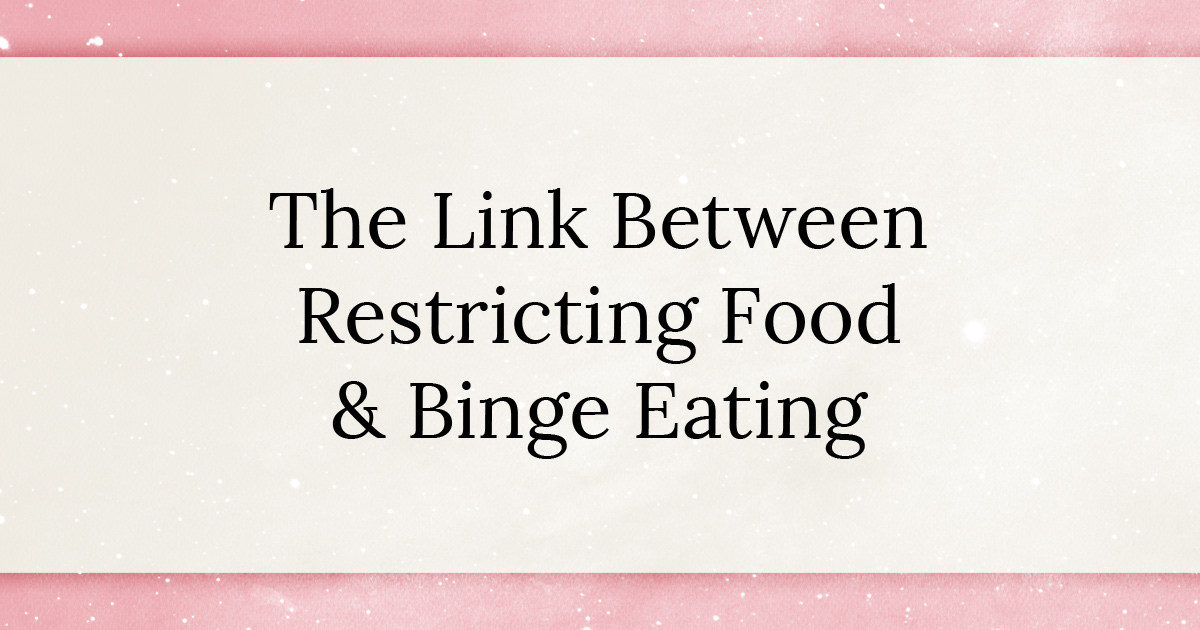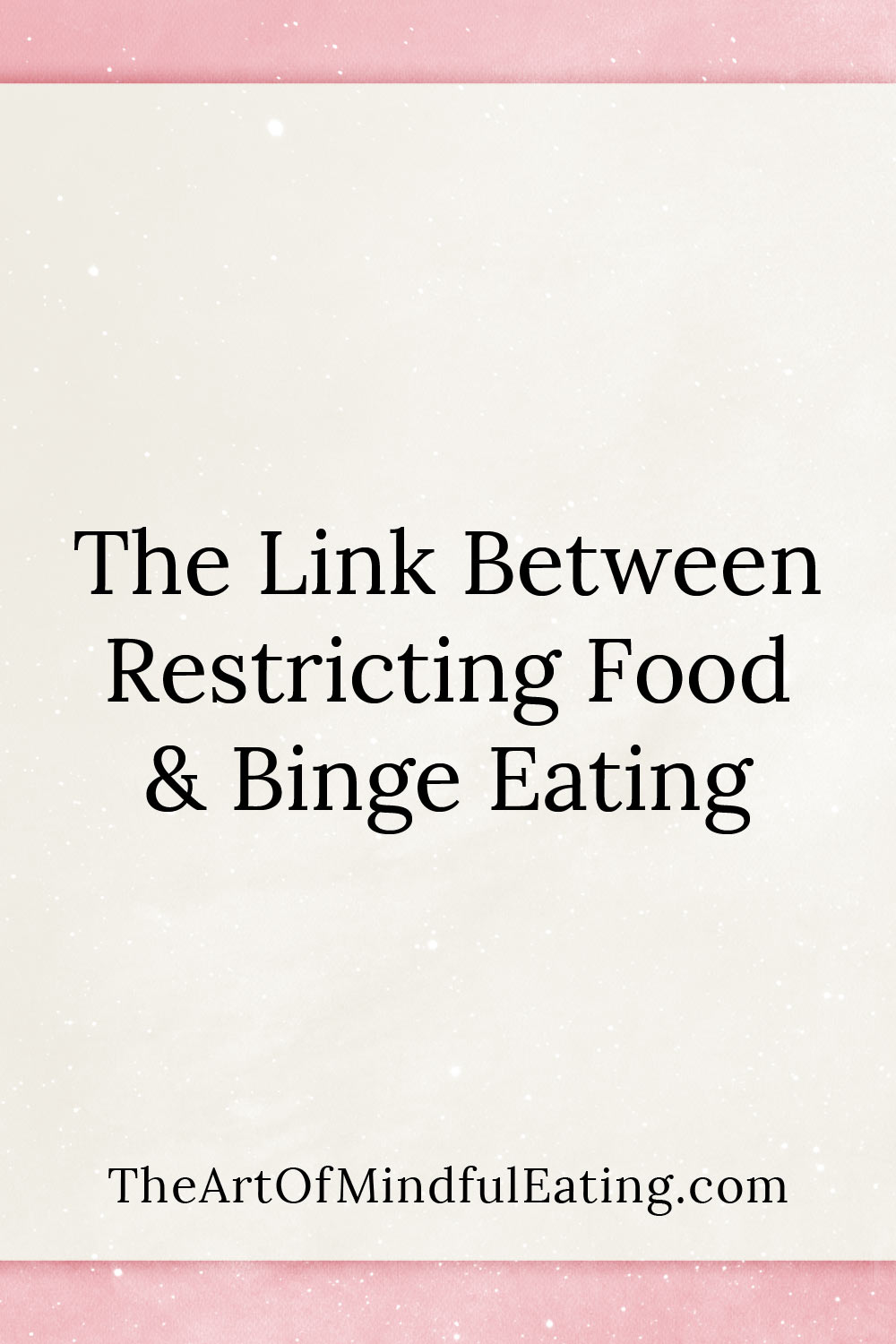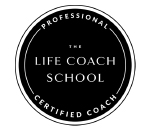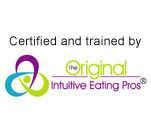The Link Between Restricting Food and Binge Eating
12 April 2024 | Written by Xenia Ayiotis
Binge eating causes great pain and suffering, the struggle is secretive because there is so much shame attached to bingeing. Many people don’t talk about it and believe they’re alone in their struggle.
There are many possible causes for binge eating: restrictive eating, trauma, emotions and habit. Those who struggle with bingeing think that the only cause is their lack of willpower and control. Or a belief that they are greedy. It’s not due to a lack of willpower, bingeing is a result of physical and mental restriction around food which drives a biological and psychological need to eat the very thing we turn to for. “Control” is actually one of the causes of binge eating. I cannot emphasise this enough, there is a direct link between dieting and binge eating. Binges go together with restrictive eating, over-exercising, and diets. For every diet, there is a backlash.
Let’s examine how dieting can lead to binge eating, looking at some specific diet-related triggers:
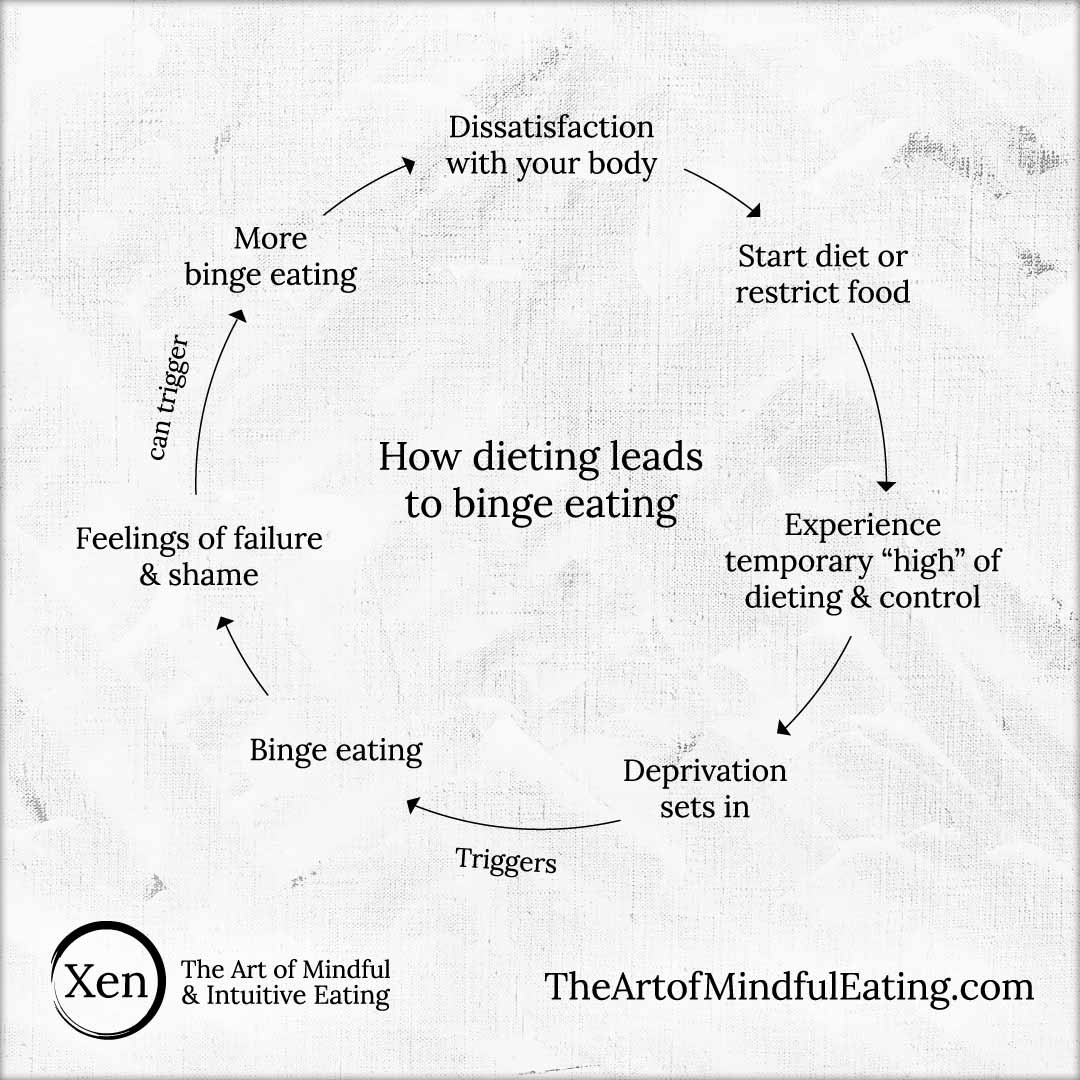
Diets have rules and as humans we either follow rules or break them. One of our core human needs is freedom and choice. When we break a food rule this often leads to “all or nothing” thinking – “I’ve blown it so I might as well carry on” – which triggers binge eating.
Depending on the diet, there will be various restrictive aspects to the diet. For example, with intermittent fasting you are skipping meals and not eating for long periods or at certain times. The body needs food for energy, when there is less energy your body will do what it can to protect you by increasing your hunger to prevent “famine”, this primal hunger can set you up for a binge.
Essentially, dieting is about eating less food, most diets have a calorie deficit, which means you may be eating too little food. Usually the calorie limit is unrealistic and your body needs more. Limits on food intake creates a physiological and biological pressure to eat and once we start it can be difficult to stop. If this is coupled with intense exercise, chances are your body will make up for this by needing more food that can lead to binge eating.
Many diets, protocols or eating plans (pick your name) involve avoiding or eliminating entire food groups. When you avoid, limit or eliminate a specific food it creates an urgency that gets stronger with each diet. The craving for these foods intensifies as deprivation deepens. As humans we need a variety of foods for satisfaction, our bodies need a variety of foods.
Diet culture frowns upon eating fun foods for the pure purpose of pleasure. We don’t just eat for fuel or because of hunger. We eat for pleasure and for connection. This is part of normal eating behaviour. Denying pleasure foods adds to the deprivation factor and that contributes to binge eating. The guilt that comes with eating forbidden foods prevents us from allowing our pleasure foods, so the only way we can eat them is through bingeing.
During a diet, the focus is on consistent weighing and body size. Following social media accounts promoting diets and unrealistic body “ideals” leads to body comparison and body shame. In diet culture weight loss is praised and weight and size are used as a measure of progress and worth. When these goals are not attained and maintained this is often a trigger to binge and numb body shame.
What practical steps can we take to prevent diet-related binge eating?
- The first step is to stop dieting.
- Eat regular satisfying meals.
- Avoid letting yourself get over-hungry.
- Eat a variety of foods.
- Eat enough food including foods for pure pleasure.
- Avoid over-exercising to compensate for eating.
- Listen to your body when it comes to exercising, avoid pushing yourself.
- When tired, rest.
- Adopt a flexible approach to hunger, snacks and meals.
- Honour your cravings.
- Recognise if you are meal hungry or snack hungry.
- Remove your focus from weight and weight loss.
- Do not withhold food to compensate for binge eating as this can lead to more bingeing.
This list of practical steps is only a start, it’s by no means the only part of the process. Binge eating cannot be overcome in the long term by a restrictive diet, this the first step to recognise before moving onto the next steps.
If you struggle with binge eating, you are not alone. I know it’s easy to lose hope, but overcoming it is possible with enough patience and compassion.
Wishing you well,
Xen
✨ Ready to get coaching around changing your relationship with food? Book a free 30-minute mini session and let’s explore what challenges you’re facing and see how the coaching and courses I offer can support you.
Hello, I'm Xen. Welcome!
I help women all over the world drop the struggle with food and their bodies to create a life of peace and freedom.
Sign up for my FREE 21-day eCourse “The Mindful Eating Moments” and get started on your journey to feeling free around food.
I respect your privacy. Unsubscribe anytime.
This site is protected by reCAPTCHA and the Google Privacy Policy and Terms of Service apply.
You might also be interested in blogs about:
“From our first meeting - two faces on Zoom across the world from each other, there was a sense of familiarity and comfort that was a healing balm for a lifetime of food struggles and dieting. Without realizing how much damage I had done to myself by adhering, for decades, to restrictive food plans and rigid diet programs, Xen had a way of redirecting the harsh and negative self-talk and sending me forth each week with compassion, mindfulness and a new way of seeing myself in the here and now. Gone are the maybe somedays, and if-only, and when-I’m-smaller thinking. Now I am committed to the imperfect and rocky path to listening to my body, accepting my perfect imperfections, and rejecting diet mentality. Those negative voices will revisit me from time to time, I know, but Xen has offered valuable tools for meeting each day as a fresh start - another choice, another chance. Her devotion to this work and her belief in her clients is a remarkable gift; I am so fortunate to have found her. It is never too late to let go of the drama and embrace joy, ease and self-acceptance.”
Karen L, Denver, USA
“I felt hopeless and helpless in my daily struggle with mindless eating for many years. Then I found Xen which is exactly what I needed! My decision to work with her helped me to finally repair my relationship with food. It's changing my life for the better, one day at a time. Now I have control over the food, instead of it having control over me, which is the way it should be. I highly recommend Xen to anyone who has a desire to overcome similar food struggles. Xen, thank you from the bottom of my heart!”
Karen J, Colorado, USA
“I reached out to Xenia because 2021 started on a tumultuous note for me. Between deaths, businesses suffering, hospitalizations, and job losses in our personal circle, I felt depleted and found myself being available for everyone but myself. Then I was hit with an unexpected health diagnosis, which was the last straw as it meant giving up “healthy foods” and workouts that I leaned on for my well-being and stability. Despite working in wellness (Yes, coaches and healers are vulnerable too!), I found myself reaching out to desserts for comfort. I like to live a life of permissions (not labels or deprivation leading to bingeing), so I wanted to work with someone who approached healing from a place of mindful compassion. I didn’t want to be my own client. Xenia was great in reminding me to be kind to myself. Working with her, brought me peace and helped shift my mindset. I love how desserts and I look at each other now.”
Sweta Vikram, New York, USA
“Working with Xenia was amazing. She armed me with a bunch of tools to help me through difficult times. Xenia is the kind of person who really cares for helping you in the long run. Her work will forever have an impact in my life.”
Daniela Velásquez, Ottawa, Canada
“Working with Xen was a game changer for me. After working together for a few months my relationship with food radically changed. I no longer felt like a failure. I now have the tools to nourish my body with foods that feel good in my body. I don’t feel guilty about eating cake or chocolate, I also don’t overeat cake and chocolate. I no longer feel the need to exercise to compensate for my eating. I feel much more free around eating and I am more accepting of my body. Xen has a nonjudgmental and compassionate approach to coaching and really supports you in the process.”
Rachel, Dublin, Ireland
“Working with Xen has been very empowering. Her approach is so refreshing from the usual. I have learned that I am in charge and that I get to choose what I put in my body and how to move my body in a way that I like! I get to make my own choices. It’s so liberating. Once you get a taste of freedom with food, there is no turning back to old ways! Thanks Xen for guiding me along the way to freedom.”
Heather B, Cork. Ireland
“This is the answer for those of you that struggle with food and all that surrounds it. Xenia said that I could make peace with food and it seemed at the time like an impossible dream. Turns out it isn’t. I recommend Xen and the mindful eating / intuitive eating approach unreservedly. If you have any questions about my experience, please get in touch. Thank you Xen. My rating: ⭐⭐⭐⭐⭐”
Michelle, Johannesburg, South Africa
“Xenia was a walking, living, breathing example of what can be done. I laughed and cried my way through a short course in this fascinating and invigorating programme with her, and have gained a designer tote full of coping skills that go way beyond containing kilogrammes. I feel infinitely lighter. I am doing this for me and, yes, you can do this for you too! And believe me, I’m cynical!”
Diana, Vancouver, Canada
“I don’t obsess about food like I used to. I am thinking differently about food and feeling so much more relaxed around all types of food. It’s wonderful to have pleasure and satisfaction from eating.”
Sarah, Illinois, USA
“I learned a new way of thinking about food. I have learned that food is not the enemy and that it can actually be enjoyed with no guilt.”
Sandy, London, United Kingdom
